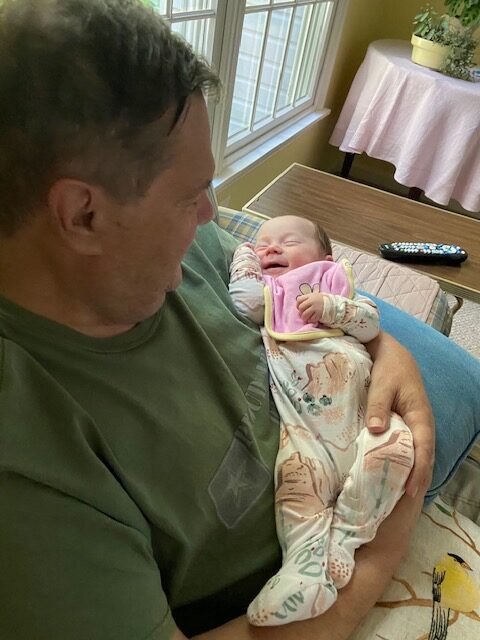“Life is a balance of holding on and letting go”
–Rumi
This has always been one of my favorite quotes about life, and when it comes to anticipatory grief, it couldn’t be truer for me.

My dad was/is a hard working man who grew up in a blue collar family with four siblings. He worked his tail off to build a good life for me, my brother, sister, and our mom. He loves football, music, and the outdoors. In 2018, after several years of us noticing memory problems, anxiety, and difficulty with multi-step tasks, he was diagnosed with Alzheimer’s at age 62. At that time, I was in the Army, stationed in upstate New York, with my husband and our son. I was fortunate enough to be compassionately reassigned shortly thereafter to Maryland to be closer to him and our family. There have been many life changes since then. My family and I moved into a new house, we weathered the pandemic, I decided to transition from Active Duty to the Reserves in order to stabilize in Maryland, my dad progressed to the moderate stage of the disease, and three months ago, I gave birth to my second child – a girl named Penelope (Penny).
Over the past three years, with the help of my husband, mom, siblings, and the YES community, I have done a fair amount of grieving the loss of who my dad used to be and mourning the loss of the future as I once imagined it. At times, I’ve even come to a place of acceptance of his diagnosis, but then something happens that jolts me into a different stage entirely. Examples in the past have included his forgetting I was in the Army, and not knowing what the NFL Draft was (he has always been a huge Ravens fan). Most recently, it has been the birth of Penelope that has me fluctuating between states of denial and sadness over the fact that my dad won’t be physically or mentally present for most of my daughter’s life. It’s times like these that Rumi’s balance of holding on and letting go feels more like a fierce tug of war than it does a balancing act. I find myself holding on tightly to every moment the two of them share together, completely unwilling to let go of my fundamental belief that Penelope should have her grandpa in her life for a much longer time than she actually will.
I know that I will eventually accept the fact that my daughter will have a limited memory, if any, of her Grandpa down the road. In the meantime, I hold on to the sweet moments and memories they are sharing right now. I try to replace my exasperation with gratitude when he asks the same questions over and over: “How does she do in the evenings? Does she ever cry?” I smile when he comments on the miracle of childbirth and when asks my personal favorite question, “How is that sweet baby of ours doing?” and I laugh with tears in my eyes when he gets so excited that he’s gotten her to smile or laugh at his silly faces and noises. I take an excessive number of photos and videos to make sure Penelope will always know just how smitten Grandpa was with her.
Finally, I try to practice self-compassion as I move through the messy, non-linear process of grieving and remind myself that life is, and always will be, a balance of holding on and letting go.




